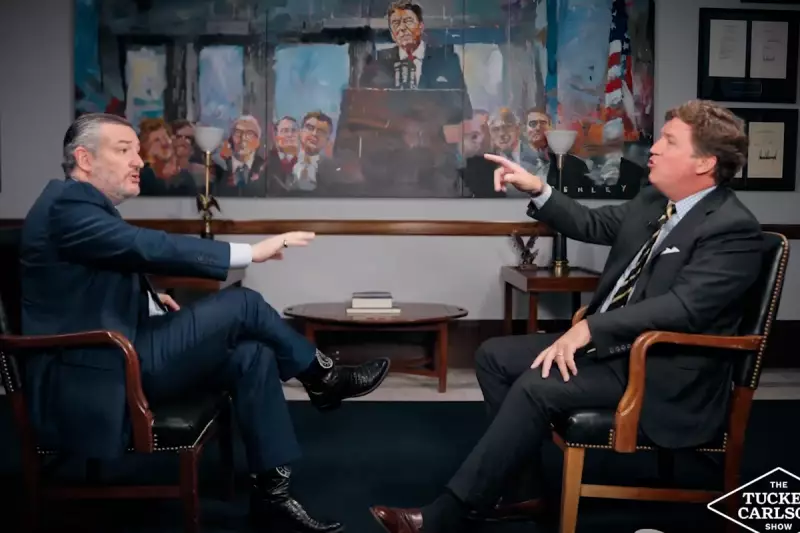
Conservative Clash: Cruz's Presidential Ambitions Fuel Republican Civil War
The simmering feud between Tucker Carlson and Ted Cruz has erupted into open political warfare, with the Texas senator explicitly leveraging their conflict to lay groundwork for a 2028 presidential bid that would position him against Carlson's ally, Vice President JD Vance. According to an Axios report published on Monday 17th November 2025, Cruz's strategic manoeuvring represents a calculated attempt to capitalise on their very public disagreements.
When confronted about Cruz's political ploy, the former Fox News star responded with characteristic bluntness, texting Axios that he found the effort "hilarious" before delivering a mocking endorsement. "Good luck," Carlson wrote. "That's my comment and heartfelt view."
From Contentious Interview to Political Fuel
The roots of this political drama trace back to a heated two-hour sitdown between the two conservative heavyweights earlier this year. During that explosive June encounter, Carlson became enraged at what he described as the "sleazy, feline way" Cruz implied he harboured antisemitic views. The interview, which Cruz later characterised as a "bloodbath," saw Carlson berating the senator for his aggressive stance towards Iran and overt support for Israel.
The tension escalated dramatically when Carlson platformed notorious white supremacist Nick Fuentes last month. The chummy interview, during which Carlson treated the Holocaust-denying "groyper" leader with surprising deference, provoked fury across the conservative movement. Fuentes used the platform to complain about "organised Jewry in America," while Carlson further alienated traditional conservatives by denouncing Christian Zionism.
Cruz Seizes Political Opportunity
Senator Cruz, a self-described Christian Zionist, emerged as one of the earliest and most vocal critics of Carlson's Fuentes interview. He has strategically used the growing controversy to position himself as "a traditional, pro-interventionist Republican" ahead of the 2028 presidential race. During a speech at the Federalist Society's National Lawyers Convention earlier this month, Cruz highlighted what he sees as widespread Republican fear of confronting Carlson directly.
"My colleagues, almost to a person, think what is happening is horrible, but a great many of them are frightened because he has one hell of a big megaphone," Cruz declared. At the Republican Jewish Coalition's annual summit, where the Fuentes interview overshadowed proceedings, the Texas lawmaker accused Carlson of spreading "a poison that is profoundly dangerous."
The senator didn't mince words when assessing Carlson's failure to challenge Fuentes' extremist rhetoric. "If you sit there with someone who says Adolf Hitler was very, very cool, and that their mission is to combat and defeat global Jewry, and you say nothing, then you are [a] coward and you are complicit in that evil," he told coalition members.
Broader Republican Civil War
The fallout from Carlson's Fuentes interview has triggered what sources describe as an internal "civil war" within the Republican Party. The prominent conservative think tank Heritage Foundation experienced an "open rebellion" with numerous resignations after its president initially defended Carlson's actions.
According to Axios, top Republicans believe Cruz's challenge to Carlson is endearing him to powerful pro-Israel donors who remain deeply angered by the podcaster's embrace of Fuentes and concerned about the GOP's shift toward isolationism. Cruz has taken concrete steps toward a presidential run, including planning a Republican donor retreat for next year, endorsing down-ballot candidates, and maintaining his podcast and radio show to build a small-dollar contributor base.
However, Cruz faces significant challenges in a Republican primary electorate that has largely abandoned its George W. Bush-era interventionist foreign policy in favour of the more isolationist "America First" approach championed by Carlson and Vice President Vance.
As Cruz attempts to exploit the fault lines within the MAGA movement, Carlson remains unequivocal about his feelings toward the aspiring presidential contender. "I have contempt for Ted Cruz," Carlson recently told The New York Times. "Not just in his public positions, but in the way that he lives." This deepening personal and political rift signals turbulent waters ahead for the Republican Party as it navigates its ideological future.





